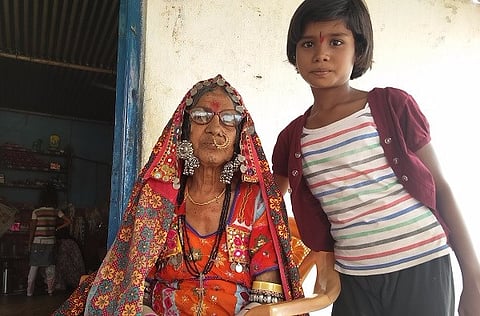

Neem trees border the dry fields on either side of the road that goes to Ashiyala tanda in Raichur district. The land has been lying fallow since the monsoon failed last June. But the unique situation of the Lambaanis of the tanda has somewhat shielded them from the worst effects of the drought: Many of these families have a steady income independent of the land.
Although the tanda is named ‘Ashiyala’ there has been serious talk about officially renaming it ‘Akshara’ tanda. Education levels among the Lambanis of this tanda are much higher compared to tandas elsewhere in north Karnataka. Because of their education, many men and women have been able to obtain government employment, including positions in the senior bureaucracy and the state police.
This includes the son of Bheemamma, aged about 65, who is a “commando” in Assam. One of her male relatives jokes: “She's planning a trip to Assam.” To this, Bheemamma grumbles about her knees and says she does not recall a summer so harsh or so dry.
“Twenty years ago we used to wash our hands and feet in the well nearby,” she says gesturing, adding that times are difficult this year.
“We get water for just half an hour, at 7 am. We have to fill our pots by then, or else there's nothing. There is competition for water,” says Kamala, 28, her daughter-in-law. The drinking water is clear, but leaves an after taste. “No matter how much you drink, it never quenches your thirst,” Bheemamma says.
Bheemamma’s family owns about nine acres of land, but because of the drought it is lying waste. The situation is the same with everyone else in the hamlet. Despite this, the overall effects of drought are not so harsh for the people here, unlike in other tandas and villages, because of family members with jobs who send money home.
“We’ve not been that badly affected, because many of us are in government jobs,” says Shilpa, Bheemamma’s daughter.
“But in other tandas there's no food, no water and nobody left in the tanda. They've all left for Bengaluru, Pune, or Bombay,” Kavita adds. Seasonal migration is common throughout Hyderabad-Karnataka but patterns differ from community to community. Although it is very much a part of the Lambani community’s life, in Ashiyala, the drought has not worsened migration as it has in other tandas and villages.
It is, ultimately, education that has been the lifeline for the people of the hamlet, which has translated into tangible benefits such as better houses. Tanda residents say that there is just one traditional house – constructed with a wooden roof – while the rest are made of concrete and other materials. Some houses look like any other house in bigger urban areas.
For historical reasons, education levels have been high in the tanda, says retired Karnataka DGP TR Naik. He says that it was two of his and his wife’s relatives inculcated a value for education in the people of this tanda.
In the 19th century, a man named Bheeka Naik was given 500 acres of land by the British in several villages including Ashiyala, Khairwadgi and Khilarti, Naik said. He divided this land among his three sons and younger sister. TR Naik is a descendent of Bheeka Naik.
Another man named Buddhivantha Naik (TR Naik’s father-in-law) was made Kulkarni (village account) by the British for several villages. This ensured that his family had money.
Because of they came in contact with the British and reaped direct benefits as a result of it, Bheeka Naik and Buddhivantha Naik worked to educate the people of their hamlet. The tangible benefits of contact with the British were land and therefore money, which they used to help other people in their tanda, says TR Naik.
TR Naik's house
Buddhivantha Naik was the first educated person of their tanda and that he ensured that others were educated. Naik was one of four boys who were educated first. They finished their SSLC in 1965 and Naik eventually passed the KPS exams and was promoted to the rank of an IPS officer during the course of his career.
TR Naik says that because there were people from the community who had made it outside the tanda, people in Ashiyala always ensured that the children were educated, which enabled them to get government jobs.
“Not to disregard the suffering of the people elsewhere, but we don't face a drought here. We have enough water and some money to tide us over,” Naik says.